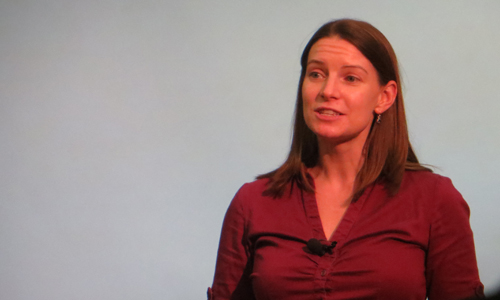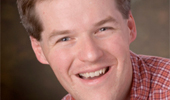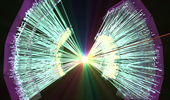“The order of the factors does not alter the product,” everyone learns in elementary school. This property, the commutativity of multiplication, which is indeed true for integers and real numbers, is not true in other settings. In fact, the emphasis at the Ohio University Center of Ring Theory and its Applications (CRA) is on studying non-commutative rings. In abstract algebra, rings are sets with two operations—usually referred to as addition and multiplication—satisfying conditions with names (associativity, commutativity, distributivity, etc.) that would sound familiar to many people. Non-commutative rings are those rings where multiplication is not commutative.
‘From the Perspective of Real Numbers, 3 is an Even Number’
“Algebraic structures often become more interesting when some properties are missing,” says Dr. Sergio R. López-Permouth, Director of the CRA. “For example, when working with only the whole numbers (rather than with the real numbers, which include fractions) it is no longer true that every non-zero element has a multiplicative inverse. In fact, the only positive integer that you can divide by, in general, is 1. From that perspective, one would think that the real numbers are a better structure than the integers. In many ways they are; however, some notions (such as being odd and even) do not make sense in a context where everybody is invertible. So, something important is missing. Over the real numbers, 3 is a multiple of 2 (the other factor being 1.5) and so, from the perspective of real numbers, 3 is an even number. Most importantly, In such a context, everybody is a multiple of everybody else, so the whole notion of a prime number gets lost. Prime numbers are a cultural milestone for mathematics and are also very useful. The security of most information transmission today depends on a cryptographic system based on properties of prime numbers.”
At Ohio University, there has been a historical emphasis on studying non-commutative rings. In addition to López, the ring theory group at Ohio University includes Professor Dinh Van Huynh and regional campus faculty members Lakdar Hammoudi (Chillicothe), Franco Guerriero (Lancaster) and Nguyen Viet Dung and Pramod Kanwar (Zanesville). Many rings, such as those of matrices and functions, lack the commutative property of multiplication. A specific example of how the absence of this property is actually beneficial, as pointed out by López, is how the famous physics law known as Heisenberg’s Uncertainty Principle can be shown to stem from the absence of commutativity in quantum operators.
López, who is originally from Guatemala, is a Professor of Mathematics in the College of Arts & Sciences, and his ring theoretic research focuses on modules over non-commutative rings. Modules are ancillary structures to rings in a way that is analogous to the connection between fields and vector spaces. His research focuses mostly on the injectivity or projectivity of modules and other related properties. “Projective and Injective modules are modules that can be thought as being as large as a module can possibly be,” says López. “The reason for the existence of two notions is because there are two different approaches to comparing modules, and each approach yields a different notion of ‘largest.’”
Through the years, much of the research at the CRA has been focused on modifications of the notions of projectivy and injectivity. Recently, López has introduced an alternative perspective by studying notions (labeled poor modules) that are the opposite of projectivity and injectivity. His work (in collaboration with doctoral students and postdoctoral visitors) has yielded various types of associated ordered structures (which they have named profiles) for every ring. The study of these various profiles aims at shedding light on the algebraic properties of the rings themselves.
Making YouTube, Cell Phones and Netflix Work
In addition to his work on ring theory, López is also active in Error-Correcting Coding theory. Algebraic Coding Theory is the technology behind error-free transmission of information through all kinds of media. From storage of music or movies in CDs, DVDs and BlueRay, through streaming of movies through the Internet (YouTube, Hulu, etc.) or Netflix, error-correcting codes (often based on algebraic structures) are hard-at-work to make sure the information arrives at its destination unharmed. You should think about this next time you place a cellphone call or have a conversation with someone using Skype. In addition to advising several doctoral students on this topic and producing scholarly papers in the area, López’ interest has led to frequent collaboration with faculty at the Russ School of Engineering. This collaboration has yielded, among other things, a U.S. patent, Apparatus and method of CTCM encoding and decoding for a digital communication system.
The Ohio University Center of Ring Theory and its Applications was founded in 2001 by López and Distinguished Professor Emeritus Surender K. Jain. Jain served as director of the CRA until his retirement in 2009, at which time López became director. The CRA has been a magnet for mathematical activity at Ohio University. The center frequently hosts speakers and holds short-courses on specialized subjects. In this way, Athens has been visited by many leading mathematicians in the past, including Fields Medalist Efim Zelmanov. (The Fields medal is considered the equivalent of the Nobel Prize in Mathematics.) The CRA is also a destination point for mathematicians to visit during sabbatical leaves and for young post-docs to receive mentoring and training during the early years of their careers.
One of the first projects of the CRA was to establish the Journal of Algebra and its Applications (JAA). With Jain and López as executive editors, JAA is completing its 11th year and is widely regarded one of the leading journals in the field of Algebra. López is a member of various other editorial boards; his membership in Advances in Mathematics of Communication is testimony to his activity in Coding Theory. Recently, he was appointed to the editorial board of the São Paulo Journal of Mathematical Sciences. Universidade de Sao Paulo is consistently ranked the top university in Latin America.
Some recent papers by Lopez:
- Holston, López-Permouth and Orhan-Ertas, Rings whose modules have maximal or minimal projectivity domain, Journal of Pure and Applied Algebra 216 (2012) 673-678.
- López-Permouth and Simental, Characterizing rings in terms of the extent of the injectivity and projectivity of their modules, Journal of Algebra 362 (2012) 56-69.
- Lopez-Permouth, Ozadam, Ozbudak and Szabo, Polycyclic Codes over Galois Rings with applications to Repeated-root constacyclic Codes, Finite Fields and Their Applications, Vol. 19, No. 1. (January 2013), pp. 16-38.
- López-Permouth and Steve Szabo, Convolutional Codes with Additional Algebraic Structure, Journal of Pure and Applied Algebra 217 (2013), no. 5, 958–972




















Comments